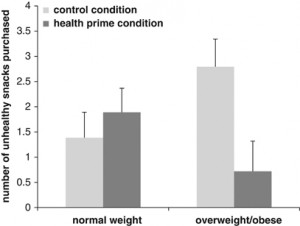Not only does the government refuse to adjust a ridiculous food pyramid that’s left more than 1/3 of the population obese and 2/3 overweight, but they fail to regulate marketing and advertising efforts that should be illegal.
And I don’t mean the sad fact that companies can put ‘no trans-fat’ on their products if they keep their level under 0.5g, that cereal companies can partner with heart associations and add ‘lowers cholesterol’ to their box, or that corn-starch filled yogurt brands can invent their own probiotic from rat feces (B regularlis).
I’m referring to the lack of regulation of in-your-face advertising – as I’m pretty sure you didn’t want a donut when you woke up, and or a bag of Doritos and a 2L Cola when you walked in the grocery store. Whether corporations are claiming it’s personal choice, or not.
The truth is, we are highly impacted by food advertising. Not only because the contents in these products are addictive (wheat, fructose, and sugar), but because most of us have become addicts.
“Did someone say free pop?”

Various research studies have shown that food cues activate reward centers in the brain that are heightened by the added sugars and artificial sweeteners that dominate the products marketed to us. For instance, researchers in France determined that:
The sweetness in sugar and artificial sweeteners surpasses cocaine reward and produces a dependency.
And it’s not just sugar and sweets. Gliadin, the protein found in wheat is broken down into amino acids called polypeptides that are permitted access to our brains (pass the blood-brain barrier) and attach to morphine receptors. This produces a euphoric feeling when consumed, which makes us crave more in the future, and even eat more now.
In one study, ‘binge eaters’ were put in a room full of food and:
Those with the effects of the addictive substance blocked, ate 28% less wheat containing snacks (pretzels, crackers, etc).
In a similar study, individuals were given free-reign to eat whatever they pleased in a cafeteria, and:
Those with the receptor blocked, ended up consuming 1/3 less food at lunch and ¼ less food at dinner.

Fighting these food cues is even more difficult for individuals that are struggling with their weight. Which aside from the addiction, stems from the fact that excess body fat decreases our motivation to improve (discussed here).
“During the study the rats were given the opportunity to press a lever for a food reward. The obese rats displayed much lazier behavior, sometimes taking twice as long between lever pushes compared to their leaner counterparts.”
The unfortunate part being, that our government refuses to protect us from the detrimental marketing incentives, but has no problem turning around and pointing the finger at us for being fat.
“It’s your fault! You eat too much and don’t exercise.”
Interestingly, when the food cues are positive those attempting to shed the fat consistently make better food choices, and are able to ignore junk food and other snack foods successfully. For instance, a recent study in the International Journal of Obesity found that:
Giving obese individuals health primes before entering a grocery store reduced their snack purchases by 75%.

So, it appears the marketing works both ways. Especially in those that are struggling to lose – who are unfortunately more affected by these unregulated marketing messages.
The question is, which cue will the consumer see? And if the government won’t help, perhaps it’s worth priming ourselves?
Surprisingly, those health and fitness magazines we all love to hate help encourage better food choices. So maybe it’s time to put the magazine rack at the front of the store?
Without a doubt the pop and chips should be moved to the back.
If it was up to me, they’d be in the garbage.
Stay Lean!
Coach Mike
RELATED ARTICLES:
High Blood Sugar AGEs The Body
Fatness & Sickness - It's Your Fault When...
Beyond Live It NOT Diet! - The Wheat-Free Feast
Struggling to Reach Your Goals? Time For a Paradigm Shift
Do You Need a Nutrition Parent? Or Did You Need a Better One?
